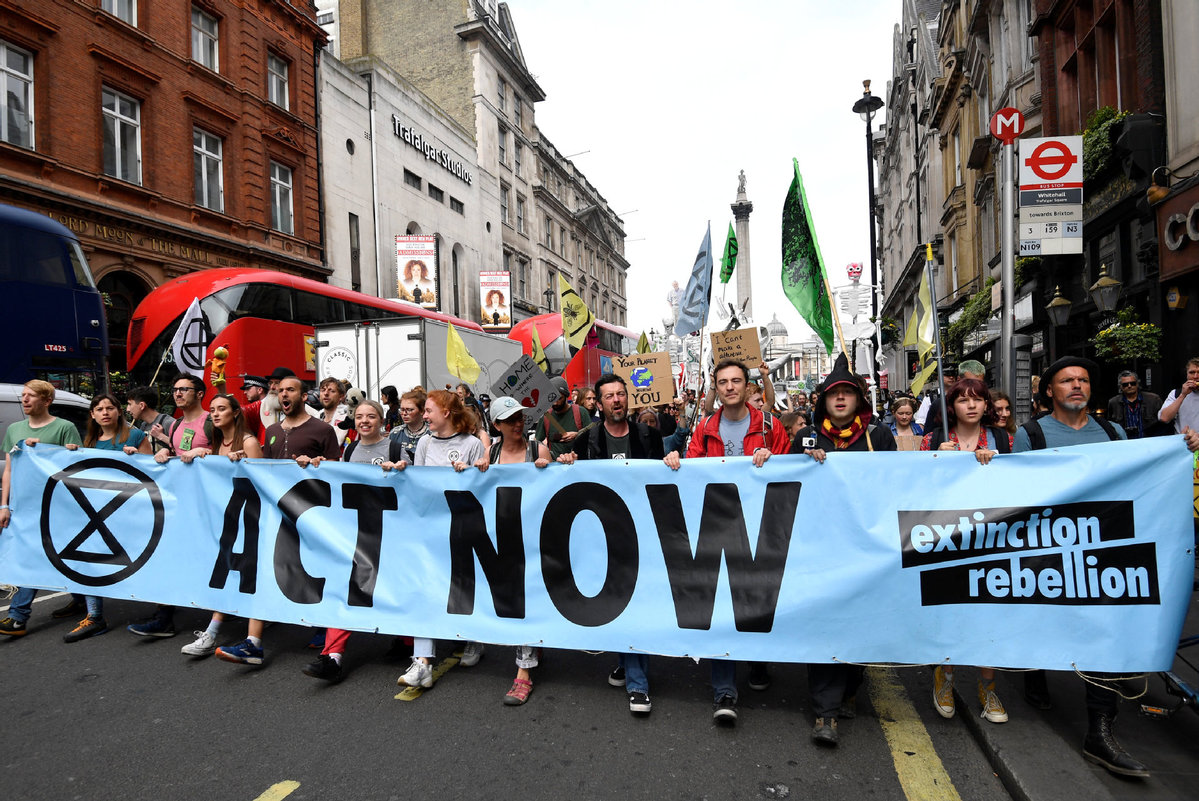Climate change: match rhetoric with action
By Harvey Morris | China Daily Global | Updated: 2019-05-14 09:08

Are we on track to curb destructive man-made global warming or is it already too late to save the planet?
Climate activists say there is still time-but only just-and some world officials and politicians appear to have reached the same conclusion.
United Nations Secretary-General Antonio Guterres has warned that politicians are backsliding on their commitments to combat global warming at a time when the crisis is accelerating.
At the start of a visit to New Zealand, he said: "We are not on track to achieve the objectives defined in the Paris Agreement. And the paradox is that as things are getting worse on the ground, political will seems to be fading."
The United Kingdom and Ireland have meanwhile become the first countries to declare a climate emergency, embracing the concerns of the popular Extinction Rebellion movement that staged protests in major Western capitals last month.
Underlying the fears that government pledges to mitigate global warming will not meet their targets is the United States decision to pull out of the Paris climate agreement, the principle international mechanism for tackling the crisis.
The climate issue is one that can logically only be addressed by concerted international action. Greenhouse gases do not respect borders and climate action in one half of the world is bound to fail if the other half continues to pump out pollution.
That dilemma has increased a focus on what individuals can do to address the climate crisis. In some of the richest parts of the world, where concern for the future of the planet has switched from apathy to near-panic, environmentalists are campaigning for a radical change in lifestyles.
In France, butchers last year sought police protection after attacks by vegans blaming meat-eaters for destroying the planet, one of a series of aggressive protests targeting businesses and restaurants in Europe and elsewhere.
A further phenomenon has been the publication in the West of earnest articles by women who have taken the decision to forswear motherhood rather than give the world another mouth to feed.
Personal choices to give up meat, air travel or even childbirth are no doubt laudable. But they will have limited impact without concerted action on a global level.
Consumers, for example, can take a decision to cut their electricity consumption by half but they cannot decide individually whether the method of generating the power they continue to use is polluting or green.
The irony is that in Europe, where what might be called the new "climate puritanism" is most evident, the totality of its population consumes far more than its share of world resources.
A report last month for the World Wildlife Fund and the Global Footprint Network found that citizens of the European Union used almost 20 percent of the earth's biocapacity even though they represent only seven percent of the world's population.
They were using twice as many resources as the region's own ecosystems were able to renew. Putting it another way, 2.8 planets would be needed if everyone consumed at the rate of the average EU resident.
The same report found that, while China has an ecological footprint twice as high as the US and the EU, head-for-head of its large population consumption is well behind that of its Western counterparts.
Clearly we can all play our part in mitigating climate change, as long as we don't lapse into the kind of apocalyptic fatalism that could be unintentionally inspired by some of the more alarmist environmental activism.
At the end of the day, however, the world is dependent on science and governments to halt the doomsday clock.
Science has played its part in developing green power and transportation. British officials recently boasted that the UK had just had its first week for more than a century without using electricity generated by coal.
Scientists are also engaged in a range of further planet-saving initiatives, such as improving farming methods and even breeding low-carbon cows.
National declarations of climate emergencies are all well and good as long as governments match their rhetoric with action that limits greenhouse emissions and encourages green energy use.
The motion passed in the UK Parliament, for example, did not bind the government to take any particular course of action on climate change.
The opposition Labour Party, which sponsored the motion, said it favored banishing companies from the London Stock Exchange unless they did enough to tackle climate change. Business leaders insisted they were not the enemy but rather part of the solution.
But is it all too little, too late? Antonio Guterres is among those world leaders who believe it is not too late but that time is running out.
























